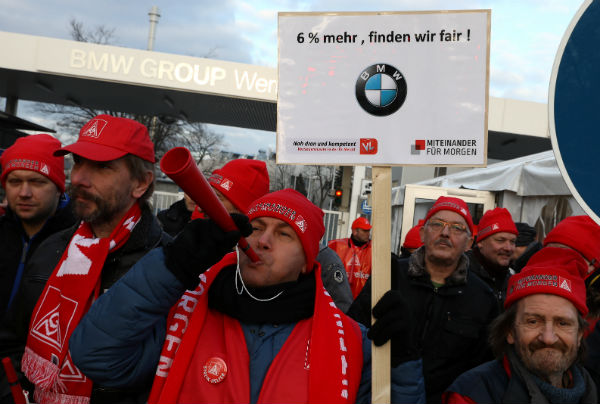Three days of rolling 24-hour strikes to end Friday evening

FRANKFURT (Reuters) — Car factories across Germany were at a standstill on Friday as industrial workers staged a third day of 24-hour strikes, focusing on plants owned by Mercedes-Benz, Porsche, Audi and BMW.
Automotive suppliers such as Schaeffler and SKF were also hit by industrial action, labour union IG Metall said. It is fighting for higher pay and more flexible working hours for 3.9 million workers in Germany.
"We expect that will boost employers' willingness to come to an agreement," Juergen Wechsler, head of IG Metall in Bavaria, said in a statement.
The full-day walkouts, due to end late on Friday, are IG Metall's last warning shot before votes are cast on whether to take extended industrial action that could cost German companies hundreds of millions of euros in lost production.
Both the union and employers have said they are open to resuming talks on Monday, but they have each insisted that the other side show more willingness to make concessions.
With Europe's largest economy in robust health and unemployment at record lows, the country's biggest union is demanding an eight per cent pay rise over 27 months for the metals and engineering sector.
The union has also asked for workers to be given the right to reduce their weekly hours to 28 from 35 to care for children, elderly or sick relatives, and to be able to return to full time after two years.
Employers have offered a 6.8 per cent wage increase, but rejected the demand for shorter hours unless they can also have the flexibility to increase workers' hours when necessary.
They have also dismissed the idea that they should make up some of the pay shortfall for workers who cut their hours.
Nearly 200,000 workers at more than 100 companies including truck maker MAN and carmaker Ford staged rolling 24-hour strikes on Wednesday and Thursday, according to IG Metall.
By the end of Friday, that figure is expected to rise to around 260 companies, which also includes many companies from other industries such as airplane maker Airbus, engineering group Siemens and farming equipment maker Deere.
The union has targeted the automotive sector in particular. The country's roughly 1,000 car and car parts makers account for roughly 10 per cent of Europe's biggest economy and rely heavily on a well-oiled supply chain of components.




